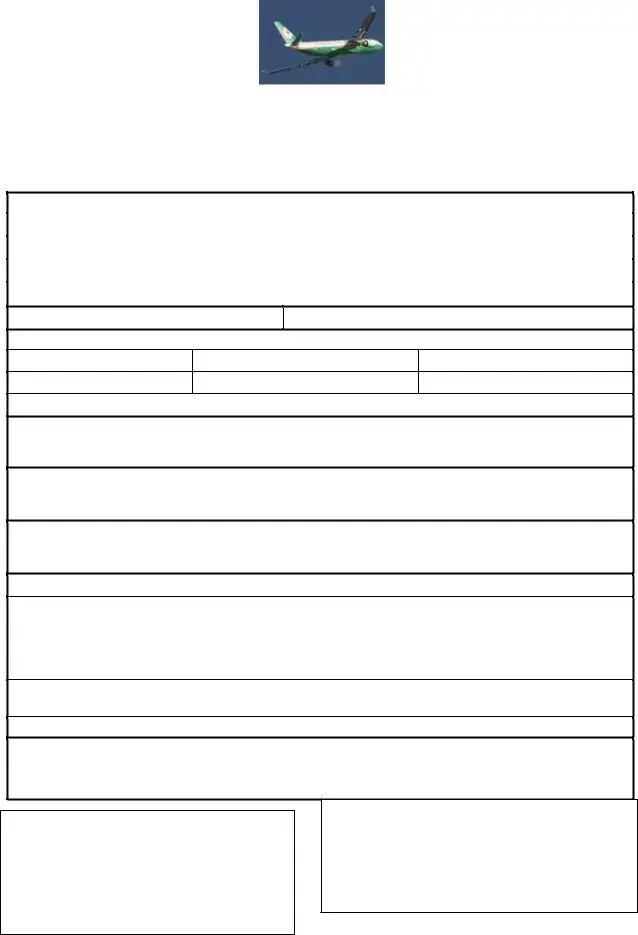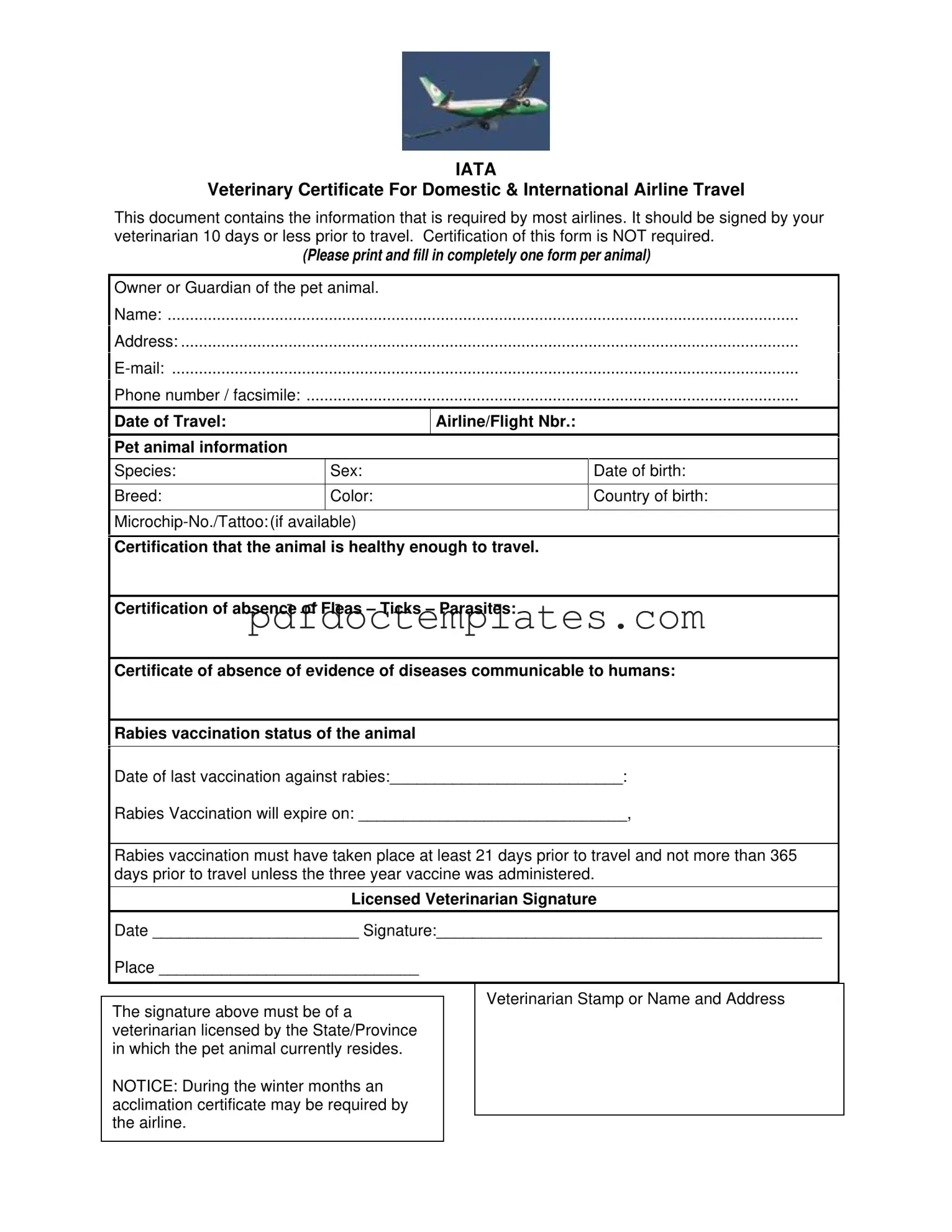Download Veterinary Certificate Travel Template
Misconceptions
Misconceptions about the Veterinary Certificate Travel form can lead to confusion and delays when traveling with your pet. Here are seven common misunderstandings:
- Certification is required for all pets. Many people believe that certification is mandatory for every pet. In reality, while most airlines require the form, certification of the form itself is not necessary.
- The form must be filled out weeks in advance. Some owners think they need to complete the form well ahead of time. However, it should be signed by your veterinarian no more than 10 days prior to travel.
- Only international travel requires this form. A common myth is that the Veterinary Certificate is only needed for international flights. This form is often required for both domestic and international airline travel.
- Any veterinarian can sign the form. Not all veterinarians are qualified to sign the form. The signature must come from a veterinarian licensed in the state or province where the pet resides.
- Rabies vaccination is optional. Some pet owners mistakenly believe that rabies vaccination is not crucial. In fact, proof of rabies vaccination is a key requirement for the form.
- Flea and tick treatment is not necessary. Many assume that flea and tick treatment is irrelevant for the travel form. However, certification of the absence of these parasites is required.
- The acclimation certificate is always needed. While some travelers think they need an acclimation certificate during winter months, it is only required by certain airlines, not universally.
Understanding these misconceptions can help ensure a smoother travel experience for you and your pet. Always check with your airline for specific requirements before your trip.
File Details
| Fact Name | Description |
|---|---|
| Purpose of the Form | The IATA Veterinary Certificate is essential for both domestic and international airline travel with pets. It provides necessary health information about the animal to ensure safe travel. |
| Veterinarian's Role | This form must be signed by a licensed veterinarian within 10 days of travel. Their signature confirms that the animal is healthy enough to travel and meets all necessary health requirements. |
| Rabies Vaccination Requirements | The rabies vaccination must have occurred at least 21 days before travel and not more than 365 days prior. If a three-year vaccine was administered, different rules may apply. |
| State-Specific Regulations | Different states may have unique requirements for pet travel. It’s important to check local laws regarding veterinary certificates and any additional documentation needed. |
Key takeaways
Here are some important points to remember when filling out and using the Veterinary Certificate Travel form:
- Complete One Form per Animal: Make sure to fill out a separate form for each pet traveling.
- Veterinarian Signature: The form must be signed by a licensed veterinarian within 10 days of your travel date.
- Health Certification: The veterinarian must certify that your pet is healthy enough to travel.
- Flea, Tick, and Parasite Check: Ensure the veterinarian certifies the absence of fleas, ticks, and other parasites.
- Communicable Diseases: The form should include a certification stating there are no diseases that could be transmitted to humans.
- Rabies Vaccination: Document your pet's rabies vaccination status, including the date of the last vaccination.
- Timing of Vaccination: Rabies vaccination must be done at least 21 days before travel and not more than 365 days prior, unless it’s a three-year vaccine.
- Acclimation Certificate: During winter, check if your airline requires an acclimation certificate for your pet.
- Contact Information: Provide accurate contact details, including your email and phone number, for any necessary communication.
Following these guidelines will help ensure a smoother travel experience for you and your pet.
Dos and Don'ts
When filling out the Veterinary Certificate Travel form, it is essential to ensure accuracy and completeness. Here are ten important dos and don’ts to consider:
- Do print the form clearly to avoid any misunderstandings.
- Do fill out one form per animal to ensure all information is specific.
- Do include the veterinarian's signature and stamp to validate the document.
- Do ensure the form is signed within 10 days of travel.
- Do provide accurate information regarding the pet's vaccination status.
- Don’t leave any fields blank, as incomplete forms may lead to issues.
- Don’t submit the form without confirming the rabies vaccination dates.
- Don’t forget to check for any additional requirements from the airline.
- Don’t use a veterinarian who is not licensed in the state where the pet resides.
- Don’t overlook the possibility of needing an acclimation certificate during winter months.
Common mistakes
-
Incomplete Owner Information: Failing to fill out all sections for the owner's name, address, email, and phone number can lead to delays. Ensure every field is filled out accurately.
-
Incorrect Travel Dates: Entering the wrong date of travel can cause issues with the airline. Double-check this information before submission.
-
Missing Pet Details: Omitting important pet information such as species, breed, or microchip number can result in complications. Each detail is crucial for identification.
-
Neglecting Health Certifications: Not providing the necessary health certifications, like the absence of fleas or ticks, can prevent your pet from traveling. These certifications are essential for compliance.
-
Rabies Vaccination Issues: Forgetting to include the date of the last rabies vaccination or its expiration can lead to travel restrictions. Ensure that the vaccination is up-to-date and documented properly.
-
Veterinarian Signature Problems: Submitting the form without a licensed veterinarian's signature or stamp can invalidate the certificate. Always confirm that the veterinarian's details are included.
What You Should Know About This Form
-
What is the purpose of the Veterinary Certificate Travel form?
The Veterinary Certificate Travel form is essential for both domestic and international airline travel with your pet. It provides airlines with necessary information about your animal's health and vaccination status. The form must be signed by a licensed veterinarian within 10 days of travel.
-
What information do I need to provide on the form?
You will need to fill in details such as your name, address, and contact information. Additionally, you must provide information about your pet, including its species, breed, sex, color, date of birth, and microchip or tattoo number if available. The form also requires certification of your pet's health and vaccination status, particularly regarding rabies.
-
How recent does the veterinarian's signature need to be?
The veterinarian's signature must be obtained within 10 days prior to your travel date. This ensures that your pet's health status is current and that all required vaccinations, especially for rabies, are up to date.
-
Are there any additional requirements during winter months?
Yes, during winter months, airlines may require an acclimation certificate. This document confirms that your pet can handle the temperature conditions during travel. It is best to check with your airline for specific requirements related to travel in colder weather.
-
Is certification of the form required?
No, certification of this form is not required. However, it is crucial that all sections are filled out completely and accurately. This helps ensure a smooth travel experience for both you and your pet.
Veterinary Certificate Travel Example

IATA
Veterinary Certificate For Domestic & International Airline Travel
This document contains the information that is required by most airlines. It should be signed by your veterinarian 10 days or less prior to travel. Certification of this form is NOT required.
(Please print and fill in completely one form per animal)
Owner or Guardian of the pet animal.
Name: .............................................................................................................................................
Address: ..........................................................................................................................................
Phone number / facsimile: ..............................................................................................................
Date of Travel:
Pet animal information
Airline/Flight Nbr.:
Species:
Breed:
Sex:
Color:
Date of birth:
Country of birth:
Certification that the animal is healthy enough to travel.
Certification of absence of Fleas – Ticks – Parasites:
Certificate of absence of evidence of diseases communicable to humans:
Rabies vaccination status of the animal
Date of last vaccination against rabies:__________________________:
Rabies Vaccination will expire on: ______________________________,
Rabies vaccination must have taken place at least 21 days prior to travel and not more than 365 days prior to travel unless the three year vaccine was administered.
Licensed Veterinarian Signature
Date _______________________ Signature:___________________________________________
Place _____________________________
Veterinarian Stamp or Name and Address
The signature above must be of a veterinarian licensed by the State/Province in which the pet animal currently resides.
NOTICE: During the winter months an acclimation certificate may be required by the airline.
Consider More Forms
Who Is the Principal Immigrant - It aims to assure that the sponsored immigrant has financial support.
For those looking to start a business in Florida, understanding the requirements of the necessary Articles of Incorporation document is vital. This form not only initiates the incorporation process but also ensures compliance with state regulations, paving the way for successful business operations.
High School Transcript - Important documentation for adult education enrollment.
